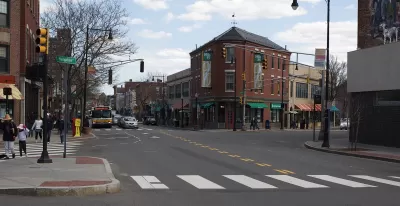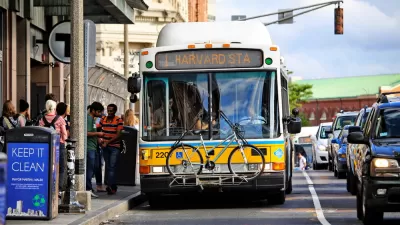The city’s original plan to decrease car ownership isn’t quite panning out, even with more alternative transportation options for residents.

Cambridge, Massachusetts, set a goal in 2014 to lower the level of car ownership by residents. The target was a decrease of 15 percent from the 1990 level, to about 0.8 cars per household, by 2020. Adam Vaccaro reports that ownership has decreased, but by less than half of the original target.
While the ownership level is down, the number of cars owned by residents has increased by 6.5 percent since 2014 and the population has also grown. "Even though much of the construction in Cambridge and other cities is concentrated near train and bus lines, the figures highlight that more people almost always means more cars," says Vaccaro.
To decrease car ownership, the city focused on improving biking and transit infrastructure. Some city officials would also like to follow the lead of Minneapolis and San Francisco with a ban on minimum parking requirements for new developments.
The decrease in Cambridge is still a contrast to neighboring Boston where household car ownership has increased by 7 percent since 1990. But Boston officials argue that the focus should be on miles driven rather than ownership rates.
Based on that measure, the situation in Cambridge looks even better. "Cambridge already boasts the lowest average number of miles driven per household in Massachusetts: fewer than 19 miles a day in 2014, according to data from the regional council," notes Vaccaro.
FULL STORY: Cambridge wanted a big drop in car ownership by 2020. That hasn’t exactly happened

Trump Administration Could Effectively End Housing Voucher Program
Federal officials are eyeing major cuts to the Section 8 program that helps millions of low-income households pay rent.

Planetizen Federal Action Tracker
A weekly monitor of how Trump’s orders and actions are impacting planners and planning in America.

Ken Jennings Launches Transit Web Series
The Jeopardy champ wants you to ride public transit.

Crime Continues to Drop on Philly, San Francisco Transit Systems
SEPTA and BART both saw significant declines in violent crime in the first quarter of 2025.

How South LA Green Spaces Power Community Health and Hope
Green spaces like South L.A. Wetlands Park are helping South Los Angeles residents promote healthy lifestyles, build community, and advocate for improvements that reflect local needs in historically underserved neighborhoods.

Sacramento Plans ‘Quick-Build’ Road Safety Projects
The city wants to accelerate small-scale safety improvements that use low-cost equipment to make an impact at dangerous intersections.
Urban Design for Planners 1: Software Tools
This six-course series explores essential urban design concepts using open source software and equips planners with the tools they need to participate fully in the urban design process.
Planning for Universal Design
Learn the tools for implementing Universal Design in planning regulations.
Heyer Gruel & Associates PA
Ada County Highway District
Institute for Housing and Urban Development Studies (IHS)
City of Grandview
Harvard GSD Executive Education
Toledo-Lucas County Plan Commissions
Salt Lake City
NYU Wagner Graduate School of Public Service





























